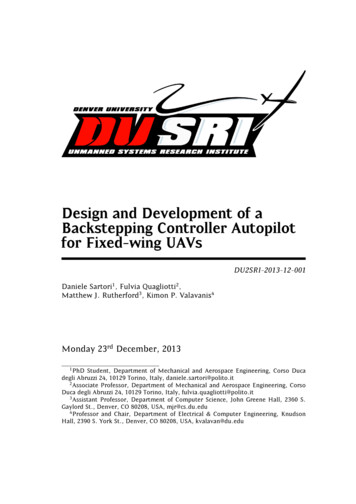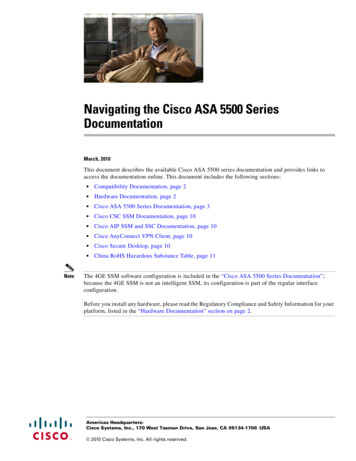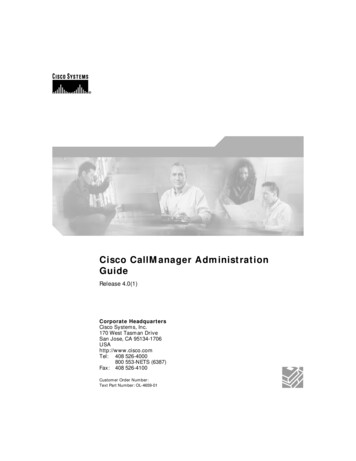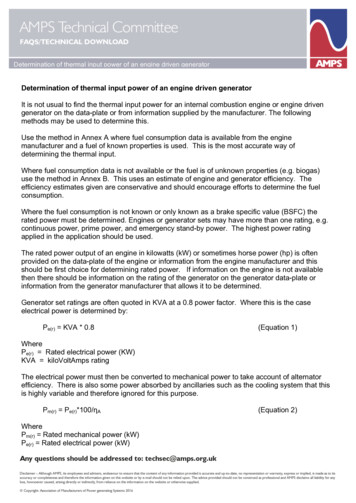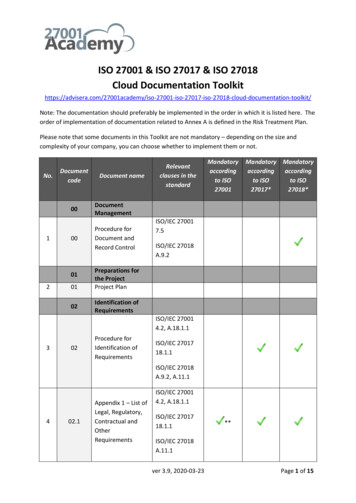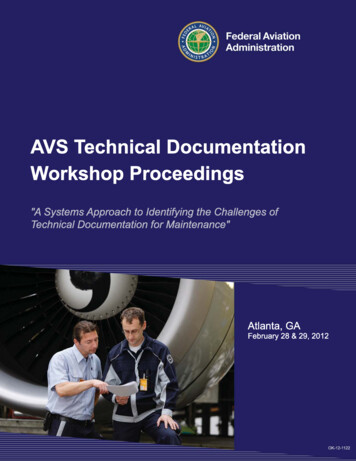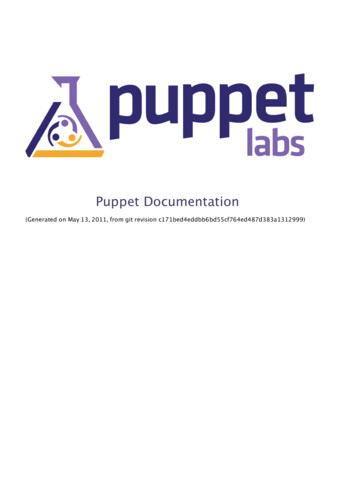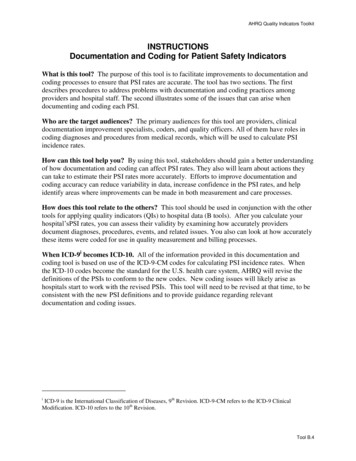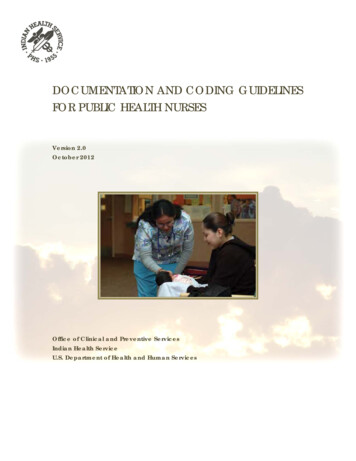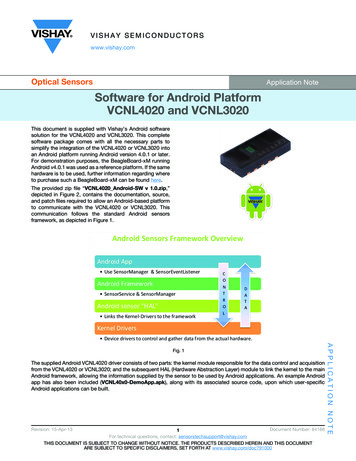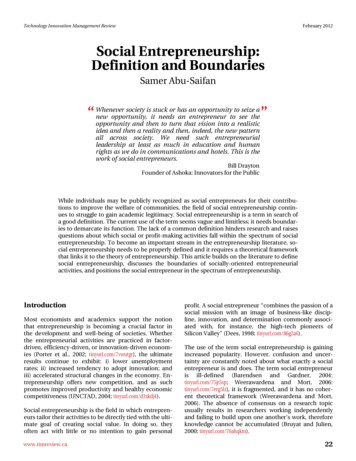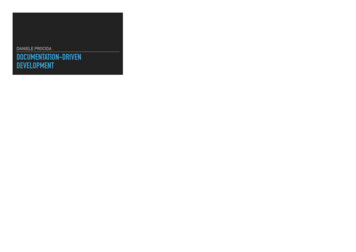
Transcription
DANIELE PROCIDADOCUMENTATION-DRIVENDEVELOPMENT
ALL ABOUT MEI work for Divio, a Swiss-based Django software and services company.DANIELE PROCIDA Community manager, Divio django CMS developer Django core developer Board member, Django Software Foundation daniele.procida@divio.com EvilDMP (IRC, GitHub, Twitter)Part of my job description is documentation manager, and I think consider myselfvery fortunate to be working at a company that considers documentation importantenough that someone should be a documentation manager - I don’t think it’s usual,especially in a company of this size.
ALL ABOUT MEDANIELE PROCIDA Community manager, Divio django CMS developer Django core developer Board member, Django Software Foundation daniele.procida@divio.com EvilDMP (IRC, GitHub, Twitter)
ALL ABOUT MEDANIELE PROCIDA Community manager, Divio django CMS developer Django core developer Board member, Django Software Foundation daniele.procida@divio.com EvilDMP (IRC, GitHub, Twitter)
Some people take quite seriously the idea that you should write yourdocumentation first, and that your code should follow.DOCUMENTATIONDRIVEN DEVELOPMENTIt’s not nearly as commonly discussed or practised as test-driven development.I’ve never heard anyone actually speak about it, or met anyone who says they doit.
DON’T DOCUMENT YOUR CODE, CODE YOUR DOCUMENTATIONDOCUMENTATION-DRIVEN DEVELOPMENT like test-driven development, puts should before is establishes a shared, easily-accessible, higher-level overview of the work provides a shared, easily-accessible metric of success encourages contribution and engagement of non-programmers binds programming effort into a coherent narrativeI don’t want to spend too much time here, but documentation-driven developmentreverses the typical priority of code and documentation. You start with thedocumentation instead of your code, and instead of documenting your code, youcode your documentation.And I don’t actually know very much more about it, though I am sure it is a valuabledevelopment discipline that more people should adopt.In fact, what I want to talk about is not this discipline, but some other senses inwhich documentation drives development.
So let’s have a look at Django, and consider what documentation has meant for itsdevelopment.DOCUMENTATION-DRIVEN DEVELOPMENTLESSONS FROM THE DJANGO PROJECT
I think the first thing we should say, not because it’s a new observation butbecause everyone seems to agree about it, is that Django’s documentation isexemplary.DJANGO’S DOCUMENTATIONIS EXEMPLARYI’ve not come across any similar project with better documentation - perhaps myexperience is limited, but no-one else seems to have discovered betterdocumentation either.
DJANGO’S DOCUMENTATION IS EXEMPLARYWHAT’S SO GOOD ABOUT IT? It’s structured properly (tutorials, how-to, reference, topics). Within that structure, it’s clear and consistent. It covers just about everything. It’s held to the highest standards. It exemplifies important values (clarity, courtesy, friendliness). Documentation in Django is a process, not just a product.
DJANGO’S DOCUMENTATION IS EXEMPLARYWHAT DIFFERENCE DOES THIS MAKE? It makes Django easier to learn and adopt. It makes people better Django programmers. It lowers the support burden. It makes the development of Django itself easier and faster.Some of the effects are obvious.
So Django’s documentation, without any doubt, has been good for Django’sdevelopment.DJANGO’S GOOD DOCUMENTATIONIS GOOD FOR DJANGOAnd here we come to the main point of my talk:
Software is not the only thing that develops and grows and improves.SOFTWARE IS NOT THE ONLYTHING THAT DEVELOPSProgrammers, and communities of programmers, also grow and develop andimprove, and they are what makes the software develop.
So the question I am particularly interested in is what does documentation meanfor the development of communities and programmers?WHAT DOES DOCUMENTATION MEANFOR THE DEVELOPMENT OFCOMMUNITIES AND PROGRAMMERS?
Django’s community, like its software, is stable, mature and dependable. Itcontains few unpleasant surprises. It’s active, engaged and remarkably united. Ithas difficulties, but not crises or lingering ills.DEVELOPING ACOMMUNITYI think that one of the glues that has bound it together is in fact Django’sdocumentation.
DEVELOPING A COMMUNITYDJANGO’S DOCUMENTATIONI think that when it comes to the development of its community, Django’sdocumentation does four very important things. represents its attitudes is an implicit contract with its community is a commitment to standards of communication and information is treated as an activity, not just as contentI said earlier that Django’s documentation represents its attitudes, but it’s evenstronger than that; the care that the documentation takes is an implicit contractwith its community, and forms a commitment to standards of communication andinformation.Django treats its documentation as an activity, not just as product, as content.This is the deepest of these points, and I will start with it.
Have you ever hesitated to ask for help with a programming question, for exampleon IRC, because you felt that the answer was already out there if only you knewhow to find it, or perhaps, how to understand it, but that you might be invited,dismissively, to Read the Fucking Manual by someone who thought you were justbeing lazy or stupid?DEVELOPING A COMMUNITYRTFMUnsympathetic programmersYou might be right to hesitate; people who already know things can be remarkablyforgetful about how they learned them, or what it was like not to know them.People are not always sympathetic and friendly to people who don’t yet knowthings that they do.
Or perhaps you’ve asked a question and someone has replied with a link to thesarcastic let me Google that for you website.It’s a horrible website. I dislike it intensely, and repudiate what it stands for.It stands for putting down people who are asking for help in understandingsomething, and telling them that the reason they don’t understand what they wantto know is that they are too stupid or lazy to learn it.
Insofar as information and documentation are considered content, it’s possible tothink and respond like in this kind of way.INFORMATION AND DOCUMENTATIONAS PRODUCT AND CONTENTThe content is out there, and it’s freely available to anyone with an Internetconnection, so go ahead, help yourself to it and if you don’t, that’s your problem.So, read the fucking manual, or use a search engine.Other people managed.
But if you understand that information is the process of informing, an activity,and that documentation is the process of documenting, then this response isless possible.INFORMATION AND DOCUMENTATIONAS PROCESS AND ACTIVITYAnd in fact, we see it far less in Django than we do in other places.Our IRC channel and email lists are friendly places, where the experts of thecommunity regard information and documentation as activities they engage in, notas stuff people should have read instead of wasting other people’s time.
DEVELOPING A COMMUNITYINFORMATION AS COMMUNICATIVE TRANSACTIONS BETWEEN AGENTSInformation, in this model, is regarded as communicative transactions betweenagents. clarity intelligibility relevance comprehension attention to the needs and abilities of the other partyInformation, in this model, demands that we respect values of clarity, intelligibility,relevance, comprehension, attention to the needs and abilities of the other party,affirmation of mutual understanding and so on. affirmation of mutual understandingWhen you’re doing that, you can’t pretend you are “informing” people by tellingthem to read the fucking manual or sarcastically Googling it for them.
GOOD DOCUMENTATIONSHOWS RESPECTIn software, good documentation, and a default position that if someone doesn’tunderstand it then the problem lies in the documentation rather than the personwho struggled to understand, becomes a sign of respect, an expression of thosevalues.Django’s documentation sets standards, expectations and the tone forcommunication, especially for communication with less expert users of it.It's an assertion of values that are subsequently reflected across the community.What all this means, I think, is that in this community, in some contexts at least, wedo think of information as the activity of informing, something we do, rather than asa collection of content, and that this idea of information has had real, meaningful,beneficial consequences for people who use Python and Django.
I said earlier that Django’s documentation has been good for Django, but really, Ithink it has been much more than merely good.DJANGO’S DOCUMENTATIONINFORMS ITS COMMUNITYTo inform is literally to shape something, to press a shape into it.Django’s documentation has literally informed, shaped its community.It has determined how the community has developed, what sort of thing hasdeveloped into, and it’s one of the things that continues to drive its development.And that is the kind of development I am speaking of, in documentation-drivendevelopment.
I want to take a brief digression here.LESSONS FROM THE DJANGO PROJECTTASTE THE DIFFERENCEThe attitude towards documentation in Django has made a tangible difference thatyou can experience for yourself in ordinary, everyday ways - you don’t have to takea high-level view of the ecosystem or community to see it.It’s brought to me quite forcefully sometimes when I speak to people outside thecosy world of Django. I have an interesting experience.If I tell a software developer that I’m a member of the Django core developmentteam, then - if they know what Django is - they seem suitably impressed. Then theyask me what I work on, and the answer is: documentation, mainly. Or I tell themthat part of my job description is Documentation manager.I’m quite proud to be a documentation manager. I’m very pleased that Divio isenlightened enough to pay someone a salary to be a documentation manager, thatthe company considers it worth spending money on. I feel lucky to be working fora company that has this kind of attitude.
But, other programmers from outside the Python community can find it hard tohide their sudden disappointment, even embarrassment or a species of bewilderedincomprehension - documentation?LESSONS FROM THE DJANGO PROJECT“DOCUMENTATION?”It’s as if they thought they were being introduced to Superman and now it turns outit’s just Clark Kent. Sometimes, I get the impression that that one of thepossibilities crossing their mind is that I am telling some sort of joke in quite badtaste.I do believe that once or twice I have even seen the thought flash acrosssomeone’s mind: “But - documentation? Isn’t that - a woman’s job?”It’s as though I were admitting to some unmanly personal habit, like crying andwhining a lot, or writing a function when I should have created a class, or using thewrong kind of workflow on Git, or doing something else that “real programmers”don’t do.But when I say to a Python or Django user that my main role is contributing todocumentation, typically the reaction I get is Oh, documentation! Cool!
NINJAS ANDROCKSTARSSo, what sort of attitudes do you expect people in programming communities tohave towards things like documentation, when so many of them think they shouldbe rock stars or ninjas? If the ideal of the programmer is a ninja or a rockstar, whatkind of space is left for activities such as documentation?Where did this come from? Why do companies think they might benefit in someway from employing rockstars or ninjas?Ninjas are famous mainly for setting fire to buildings in the dead of night, which isan interesting metaphor upon which to base a company’s recruitment strategy.As for the notion of employing rockstars - the mind boggles.
Really?What are the defining characteristics of a rock star? What comes to mind arethings like excessive behaviour and unreasonable demands.The whole thing seems unbelievably immature.
You’d think that maybe airline pilots would be a more appropriate metaphor.Or surgeons, or chefs, or anything at all, in which being disciplined, thoughtful andhighly-skilled and being able to collaborate well with other people to achieve goodoutcomes, would be better metaphors for excellent programmers.
But no: ninjas and rockstars. Literally, arsonists and arseholes.NINJAS ANDROCKSTARSThis sort of thing can be dismissed as childish and immature, but it bothrepresents a way people do in fact think about software development, and affectshow they think about it.It makes the companies and the projects where such attitudes are allowed toprevail worse places to be, and harms them: it has negative effects on theirdevelopment.
And genuinely, I think that Django’s documentation has been part of what hashelped Django avoid this.DJANGO’S DOCUMENTATIONINFORMS ITS COMMUNITYSo it has informed, shaped, the Django community. It has made the community abetter place to be. It really has helped develop the Django community.
Documentation has implications for programmers in similar ways.Developers develop, which is to say, their programming skills develop, get better.DEVELOPINGPROGRAMMERSThe question for many programmers is: how do I develop, become a betterprogrammer?It’s a true but fairly uninteresting observation that good Django documentationhelps Django programmers write better code.In fact documentation has wider implications than that.
DEVELOPING PROGRAMMERSDOCUMENTATION represents an easy way in for new contributorsDocumentation is an excellent way for newcomers to start contributing to opensource software. You don’t need to be an expert in something to be able to identifysomething unclear or lacking in its documentation and suggest a way to improve it. is almost always welcome raises its author’s understanding to new levelsWriting documentation represents easy progress to the next step from being a userto being an active contributor of a system.Documentation is almost always welcome; in fact in most projects it’s not somuch welcome as desperately needed. It’s far easier to get new documentationaccepted than a new feature.And explaining something to someone else is just about the best possible way toexplain it to oneself, to learn and understand it.So if part of a programmer’s development is to contribute and understand more,documentation is an ideal way to do it.The Django project understands all this.
Django’s documentation structure guides and encourages new contributions andcontributors.DJANGO’S DOCUMENTATIONGUIDES NEW CONTRIBUTIONSIn Django, the clarity of the documentation’s structure makes it almost obvioushow and what to write for a particular section, just like well-written code does.This works just as well for large contributions, such as an entire new section in thetutorial, or for tiny ones, such as an aspect of some key function that deservesmore explanation.
Contributions to Django’s documentation are taken seriously and held to thehighest standards.CONTRIBUTIONS TO DJANGO’SDOCUMENTATION ARE TAKEN SERIOUSLYAND HELD TO THE HIGHEST STANDARDSThis means that contributors and contributions to documentation receive as muchsupport and engagement as those to code. In many other projects, documentationis so desperately needed that almost any contribution will be accepted justbecause it’s documentation and someone cared enough to write some.In Django documentation goes through the same wringer that code goes through,and a pull request will be returned time and again until it’s perfect.In one sense this can be tiresome, when it’s your pull request that needs to beimproved before it’s accepted. But in another sense, it’s a message that whatyou’re contributing is as important and as valuable as code, and therefore that you,contributing documentation, are as important and valuable as the contributors ofcode.
Contributions - and the contributors who make them - to Django’s documentationare valued and recognised.CONTRIBUTIONS TO DJANGO’SDOCUMENTATION ARE VALUEDThe members of Django’s core team are people who have made substantialcontributions to Django: mine have all been contributions to its documentation.
These three things - that the documentation guides contributors to it, thatdocumentation is taken seriously, that contributions and contributors to it arevalued highly - is something that Django gets right in important ways.DOCUMENTING CODE IS THE BESTPOSSIBLE WAY TO UNDERSTAND ITThey’re especially important because of a fact, one that many people say theyrecognise, but few seem to act as though they do.And that’s this, that documenting code is the best possible way to understandit.Documenting code will make you a programmer who understands more andunderstands more deeply - and Django encourages developers to writedocumentation.
All of this means that Django not only gets more and better contributions to itsdocumentation than other projects do, it also advances the skills, confidence andusefulness of the developers who contribute it.DJANGO’S DOCUMENTATIONADVANCES THOSE WHOCONTRIBUTE TO ITIf you want to learn how to contribute to open source software in Python, there’shardly a better way to start than by doing some work on Django’s documentation.
So I this is what I mean when I say that Django does documentation-drivendevelopment: I mean that through its documentation it develops, advances,improves both its community and its developers.DJANGO DOES DOCUMENTATIONDRIVEN DEVELOPMENT
That’s the lesson from Django.WHAT CAN YOURPROJECT DO?What can your project do to reap some of the same rewards from itsdocumentation?I don’t think it’s something that can be accomplished overnight. Much of this is todo with attitudes, and attitudes are notoriously hard things to change.On the other hand, some of the actual steps you can take are easy, and I think thatif you keep taking them in the right direction, eventually attitudes will follow.
WHAT CAN YOUR PROJECT DO?PRACTICAL STEPS Structure your documentation correctly (tutorials, how-to, reference, topics).Structure your documentation correctly, into tutorials, how-to, reference, topics.See the first page of the Django documentation for a description of them. umentation-is-organized Make your documentation policies as rigorous as your code policies. Document your documentation. Value your documentation contributors. Value the activity of documentation and information.In brief:Tutorials need to lead users step-by-step to success, to give them confidence andan appetite for more. They should do the minimum of explanation; explanationcomes later. At this stage, the user will learn by doing things and using the system.A tutorial should be like teaching a child how to prepare a simple dish, starting withthings like how to wash your hands and use a knife safely. And at the end, the childshould be able to enjoy the food.How-to documentation is like a recipe. You can assume some competence andbasic understanding. It’s still step-by-step, but it’s more advanced and practicallyoriented than aimed at pedagogy.Reference material describes the machinery of the system. It explains its innerworkings, or the use of a particular component of it, rather than how to achievesome particular end with it - it’s like a technical description of the different kinds ofpasta that go with different sauces, or a list of cooking temperatures.Topic documentation is discursive; it takes a step back and looks at a topic from ahigher level. It can describe and explain general principles, design decisions andso on. It’s useful for putting things into context, like a book about food and eating.
WHAT CAN YOUR PROJECT DO?PRACTICAL STEPS Structure your documentation correctly (tutorials, how-to, reference, topics). Make your documentation policies as rigorous as your code policies. Document your documentation. Value your documentation contributors. Value the activity of documentation and information.Make your documentation policies as rigorous as your code policies. Don’t beafraid to bat documentation back at its contributors: take them, and theircontributions, seriously. You wouldn’t accept substandard code from them, orcode without review; don’t accept their documentation simply because it’sdocumentation. They’ll appreciate being taken seriously.Substandard code can harm your applications; substandard documentation isdetrimental to your community.Document your documentation. Make sure it’s clear what those policies are, andwhat you want from each section of the documentation.Value your documentation contributors. Recognise them, publicly.Value the activity of documentation and of information. Set aside time for it.
WHAT CAN YOUR PROJECT DO?PRACTICAL STEPSIf you, or your project or your organisation or your company are serious about this,there are some things you can do - real commitments that you can make. Make being a Documentation manager part of someone’s role. Spend money and time on documentation.For example, make being a Documentation manager part of someone’s role. Paysomeone to have that responsibility. Spend money and time on documentation.All of these will help you on the way to achieving the things on the previous page,and above all will send a message about what documentation means in thecompany or project.
WHAT CAN YOUR PROJECT DO?READ THE DOCS & WRITE THE DOCSRight here in the Python community, we have one of the most important andvaluable resources anywhere: Read the Docs. Support readthedocs.org. Attend a Write the Docs conference or workshop - writethedocs.org.Read the Docs is free, it works brilliantly, and it’s cruelly underfunded.Support Read the Docs. Sponsor it.Attend a Write the Docs writethedocs.org conference or meetup writethedocs.org. They can transform the way you approach your documentation,and in turn, the way you develop your software.Read the Docs and Write the Docs are part of the Python world, and emerged fromit - Python’s respect for documentation is one of the reasons for this.
If you’re persuaded by this analysis of the role of documentation in development,there are many, many things you can do to make it do the best for you.INFORMATION AND DOCUMENTATIONARE ACTIVITIES, NOT PRODUCTSBut if there’s just one thing you take away from this talk, I hope it’s this insight,because it’s the one from which everything else follows, that information anddocumentation are activities that you engage in, not things that you produce.
THANK YOUANY QUESTIONS?
DOCUMENTATION-DRIVEN DEVELOPMENT - LESSONS FROM THE DJANGO PROJECTDANIELE PROCIDA daniele.procida@divio.com EvilDMP on IRC, GitHub, Twitter etc
ALL ABOUT ME DANIELE PROCIDA Community manager, Divio very fortunate to be working at a company that considers documentation important django CMS developer Django core developer Board member, Django Software Foundation daniele.procida@divio.com EvilDMP (IRC, GitHub, Twitter) I work for Divio, a Swiss-based Django software and services company.
